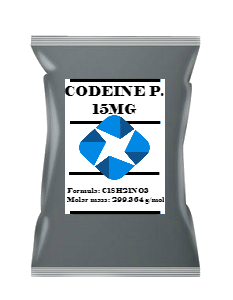Description
BUY CODEINE PHOSPHATE 15MG ONLINE
Codeine Phosphate 15mg belongs to a group of medicines called opioid analgesics and is used to control mild or moderate pain that is not controlled by the use of other painkillers, such as paracetamol or ibuprofen. Codeine Phosphate 15mg can be used either alone or in combination with other painkillers .
How to take Codeine Phosphate 15mg
It is important to read the enclosed leaflet carefully before using codeine phosphate tablets. For adults, the recommended dose is 30-60 mg every four to six hours, up to four times a day – swallow the tablets whole with water. No more than 240mg (8 tablets of 30mg strength) tablets should be taken in any 24-hour period.
There is a risk of addiction or tolerance to codeine if it is taken for long periods of time. Only use the tablets for as long as you need to, and tell your doctor if they start to become less effective, or if you feel that you need to use them for long periods of time. We would recommend that they are only used for up to three days at a time.
Do not drink alcohol whilst taking Codeine Phosphate 15mg tablets.
Is Codeine Phosphate 15mg suitable for me?
Just like with all medicines, there are certain situations where codeine should be used with caution or it may not be recommended at all.
For pain relief in children and adolescents (0-18 years of age) after removal of their tonsils or adenoids due to obstructive sleep apnoea syndrome, codeine is not recommended.
Do not take codeine phosphate tablets if you:
- Are allergic (hypersensitive) to codeine or other opioids, or any of the ingredients in the tablet (see section six)
- Have difficulty breathing or live with any other chronic lung disease
- Have suffered head injury or raised pressure in the skull (this may cause pain in the eyes, changes in vision or headache behind the eyes)
- Are having an asthma attack
- Have liver failure
- Are at risk of blocked intestines
- Suffer with alcohol issues
- Know that your body metabolises codeine into morphine very rapidly
Check with your doctor or pharmacist before taking codeine phosphate tablets if you:
- Have Liver or kidney problems
- Have diseased adrenal glands (Addison’s disease) or high blood pressure caused by a tumour near a kidney (pheochromocytoma)
- Have inflammatory bowel disease, including severe bloody diarrhoea (pseudomembranous colitis)
- Have gall bladder disease or gall stones
- Have recently had surgery on your gastro-intestinal tract or urinary system
- Have an enlarged prostate gland and have difficulty urinating.
- Have epilepsy
- Are elderly or frail
- Suffer with asthma or breathing problems
- Have an underactive thyroid gland
- Have muscle weakness (myasthenia gravis)
- Have low blood pressure or are in shock
- Have suffered from alcohol issues, drug abuse or dependence or mental health issues
Taking codeine with other medicines may cause potential problems, so consult with your doctor if you are undertaking a course of treatment that has either been prescribed or bought over the counter. These can include:
- Medicines to treat depression such as monoamine oxidase inhibitors (MAOIs e.g. moclobemide, linezolid or selegiline. Avoid codeine phosphate tablets for two weeks after stopping the MAOI) or tricyclics (e.g. amitriptyline)
- Ciprofloxacin (antibacterial medicine)
- Metoclopramide or domperidone (to prevent sickness)
- Mexiletine or quinidine (to treat irregular heartbeats)
- Loperamide or kaolin (to treat diarrhoea)
- Cimetidine (to treat stomach ulcers)
- Medicines used to treat high blood pressure
- Antiviral medicines such as ritonavir
- Medicines to treat allergies (antihistamines) that can cause drowsiness
- Atropine (anticholinergic medicines)
- Medicines which affect the nervous system such as chlorpromazine, diazepam, temazepam
- Anaesthetics
- Opioid antagonists (buprenorphine, naltrexone, naloxone)
If you are, or think you are, pregnant, you should not take codeine phosphate. The same applies if you are breastfeeding or are planning to breastfeed. The only circumstances under which you should take these tablets would be when your doctor has specifically advised you to.
So your doctor can fully assess you, ensure you give them a full picture of your health so they can your doctor can decide whether codeine is suitable for you.
What are the side effects of Codeine Phosphate 15mg?
Codeine phosphate tablets may make you feel drowsy, confused or dizzy, cause fits, blurred or double vision or to see things that are not there. Make sure you are not affected before you drive or operate machinery.
The treatment may cause side effects, however not you might experience them. Potential side effects include:
- Allergic reactions – skin rash or itchy skin, difficulty breathing, increased sweating, redness or flushed face
- Gastrointestinal system – constipation, feeling or being sick, dry mouth and abdominal pain (which may be caused by spasm of the bile ducts)
- Heart – slow or fast heart rate, palpitations, low blood pressure or low blood pressure on standing
- Urinary system – pain and difficulty in passing urine and a less frequent need to do so
- Nervous system – malaise, tiredness, ‘spinning’ sensation, fits, increased pressure in the skull (painful eyes, changes in vision or headache behind the eyes), headache, tolerance (medicine has less effect) or dependence (suffer from withdrawal symptoms e.g. tremor, sweating, increased heart and breathing rate, raised blood pressure and feeling or being sick if the medicine is stopped too quickly)
- Psychiatric effects – mood changes, depression, hallucinations (seeing or hearing things that are not real), restlessness, excitation, nightmares or confusion
- Eyes – blurred or double vision, or extremely small pupils
- Others – muscle stiffness, decrease in sex drive, difficulty breathing and low body temperature.


